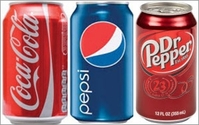
Berkeley, Calif., has become the first U.S. city to pass a measure taxing regular soft drinks and other beverages with added sugar.
The passage of
Measure D means that a one-cent tax will be imposed on energy drinks, iced teas and juices with added sugar, as well as regular sodas.
The measure, which required only a
simple majority to pass, was favored by 75% of voters, reported The Wall Street Journal.
However, a ballot measure in San Francisco proposing a two-cent-per-ounce tax on drinks containing caloric sweeteners failed to win the two-thirds support required (54.5% of voters voted
for the measure).
advertisement
advertisement
In the U.S., a number of state and city efforts to impose taxes or implement other policies intended to reduce consumption of sugary beverages have been defeated
in recent times. Examples include tax proposals in Massachusetts, Richmond and El Monte, Calif., and Telluride, Colo., and a 2012 proposal in Florida that would have restricted use of food stamps to
buy sugary beverages and junk food.
But proponents have continued to introduce tax and other proposals aimed at sugar-added drinks at the local and state levels, even as the
beverage industry, convenience stores and other groups continue to fight such initiatives with major PR, advertising and lobbying efforts.
The American Beverage Association, which
represents U.S. beverage makers, spent about $2 million in Berkeley and more than $9 million in San Francisco to fund anti-tax campaigns, reported the WSJ. As of Oct. 7, the Berkeley
pro-tax campaign had raised about $135,600, reported The New York Times.
Since 2009, the beverage industry, led by The Coca-Cola Company, PepsiCo and Dr Pepper Snapple, have
spent more than $117 million to defeat or roll back soda taxes in more than a dozen cities, according to Michael F. Jacobson, executive director of nutrition watchdog group The Center for Science in
the Public Interest. CSPI donated $15,000 to the "Yes on D" campaign in Berkeley.
The ABA contends that "people don't support taxes and bans on common grocery items like soft
drinks" — citing, for example, an August poll by Rasmussen that found 72% of Americans saying they're against such taxes. ABA argues that the focus should be on more "meaningful" and effective
approaches to fighting obesity, such as the beverage industry's new commitment to
running educational campaigns and other efforts with a stated goal of reducing beverage calories consumed per person by 20% by 2025.
Roger Salazar, who helped lead
the opposition campaign in Berkeley, has said that Berkeley (which has just 117,000 residents) is extremely atypical, and "not necessarily the trend-setter they claim to be." Berkeley is "a
nuclear-free zone," he toldThe New York Times in early
October. "They give free pot to low-income folks. Berkeley is Berkeley.”
But CSPI's Jacobson released a statement asserting that the Berkeley law's passage is "a historic
victory for public health and a historic defeat for the increasingly disreputable soda industry." He added that "Coca-Cola, PepsiCo, and the American Beverage Association can no longer count on
spending their way to victory," and predicted that many cities, towns and states will now be encouraged to propose similar tax measures.
And New York Times columnist
Mark Bittman told BeyondChron.org that he views the Berkeley passage as a "very significant victory" that brings the "inevitable scenario" of
people drinking increasingly fewer sugary drinks "much closer."
In July, U.S. Rep. Rosa DeLauro (a Connecticut Democrat who was re-elected on Tuesday) introduced the Sweet
Act, which would impose a one-cent federal tax per teaspoon of sugar in soft drinks. DeLauro asserts that such a tax would both reduce drink consumption and raise nearly $10 billion a year that could
be used for health programs.